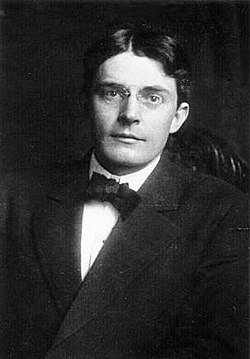
Back بوابة:علم النفس Arabic Portal:Psikologi BAN Портал:Психология Bulgarian دەروازە:دەروونناسی CKB Portál:Psychologie Czech Portal:Psychologie German Portal:Psicología Spanish Portaal:Psühholoogia Estonian درگاه:روانشناسی Persian Teemasivu:Psykologia Finnish
The Psychology Portal
| Part of a series on |
| Psychology |
|---|
Psychology is the scientific study of mind and behavior. Its subject matter includes the behavior of humans and nonhumans, both conscious and unconscious phenomena, and mental processes such as thoughts, feelings, and motives. Psychology is an academic discipline of immense scope, crossing the boundaries between the natural and social sciences. Biological psychologists seek an understanding of the emergent properties of brains, linking the discipline to neuroscience. As social scientists, psychologists aim to understand the behavior of individuals and groups.
A professional practitioner or researcher involved in the discipline is called a psychologist. Some psychologists can also be classified as behavioral or cognitive scientists. Some psychologists attempt to understand the role of mental functions in individual and social behavior. Others explore the physiological and neurobiological processes that underlie cognitive functions and behaviors.
Psychologists are involved in research on perception, cognition, attention, emotion, intelligence, subjective experiences, motivation, brain functioning, and personality. Psychologists' interests extend to interpersonal relationships, psychological resilience, family resilience, and other areas within social psychology. They also consider the unconscious mind. Research psychologists employ empirical methods to infer causal and correlational relationships between psychosocial variables. Some, but not all, clinical and counseling psychologists rely on symbolic interpretation. (Full article...)
Selected article -
Confirmation bias (also confirmatory bias, myside bias, or congeniality bias) is the tendency to search for, interpret, favor and recall information in a way that confirms or supports one's prior beliefs or values. People display this bias when they select information that supports their views, ignoring contrary information or when they interpret ambiguous evidence as supporting their existing attitudes. The effect is strongest for desired outcomes, for emotionally charged issues and for deeply entrenched beliefs.
Biased search for information, biased interpretation of this information and biased memory recall, have been invoked to explain four specific effects:
- attitude polarization (when a disagreement becomes more extreme even though the different parties are exposed to the same evidence)
- belief perseverance (when beliefs persist after the evidence for them is shown to be false)
- the irrational primacy effect (a greater reliance on information encountered early in a series)
- illusory correlation (when people falsely perceive an association between two events or situations). (Full article...)
Selected image -

Quotes -
- "Cogito, ergo sum: I think, therefore I am." — René Descartes
WikiProjects
Selected biography -

John Broadus Watson (January 9, 1878 – September 25, 1958) was an American psychologist who popularized the scientific theory of behaviorism, establishing it as a psychological school. Watson advanced this change in the psychological discipline through his 1913 address at Columbia University, titled Psychology as the Behaviorist Views It. Through his behaviorist approach, Watson conducted research on animal behavior, child rearing, and advertising, as well as conducting the controversial "Little Albert" experiment and the Kerplunk experiment. He was also the editor of Psychological Review from 1910 to 1915. A Review of General Psychology survey, published in 2002, ranked Watson as the 17th most cited psychologist of the 20th century. (Full article...)
Did you know (auto-generated) -

- ... that Ahmad Nasuhi ordered a subordinate to attack the Indonesian Communist Party's offices with grenades as "psychological warfare against the central government"?
- ... that a study of people who reported experiences of alien abduction found that many exhibited characteristics consistent with fantasy-prone personality?
- ... that some researchers have studied Tetris as a potential form of psychological treatment?
- ... that Fortnite's Tilted Towers was described by critics as the equivalent of "psychological torture" and being "dropped into a meat grinder"?
- ... that Cara De Silva described a cookbook compiled by a woman in Terezin concentration camp as a record of "psychological resistance”?
- ... that the psychological inner space genre was a rebellion against the traditional focus of science fiction on literal outer space?
Subcategories
Related portals
More did you know -

- ...that Walter Bowart (pictured) was a proponent of the counterculture movement of the 1960s, the writer of a seminal book on mind control, as well as a prolific publisher and editor of both newspapers and magazines?
- ...that Richard C. McCarty helped launch the "Decade of Behavior" campaign to bring attention to the importance of behavioral and social research?
- ...that one of the most important advances in medieval Muslim psychology was the establishment of the first psychiatric hospitals?
- ...that race car journalist and former race car driver Dr. Dick Berggren decided to stop teaching college psychology after he was called into the college president's office because he parked his racecar in the faculty parking lot?
Psychology topics
Recognized content
Associated Wikimedia
The following Wikimedia Foundation sister projects provide more on this subject:
-
Commons
Free media repository -
Wikibooks
Free textbooks and manuals -
Wikidata
Free knowledge base -
Wikinews
Free-content news -
Wikiquote
Collection of quotations -
Wikisource
Free-content library -
Wikiversity
Free learning tools -
Wiktionary
Dictionary and thesaurus
© MMXXIII Rich X Search. We shall prevail. All rights reserved. Rich X Search





















